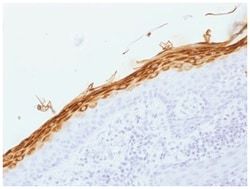Filaggrin Antibody (FLG/1561), Novus Biologicals™
Mouse Monoclonal Antibody
Manufacturer: Fischer Scientific
The price for this product is unavailable. Please request a quote
Antigen
Filaggrin
Concentration
0.2 mg/mL
Applications
Flow Cytometry, Immunocytochemistry, Immunofluorescence, Immunohistochemistry (Paraffin), SDS-Page
Conjugate
Unconjugated
Host Species
Mouse
Research Discipline
Cytoskeleton Markers
Formulation
10mM PBS with 0.05% BSA with 0.05% Sodium Azide
Gene ID (Entrez)
2312
Immunogen
Recombinant human Filaggrin protein fragment (aa 198-288) (exact sequence is proprietary)
Primary or Secondary
Primary
Content And Storage
Store at 4C.
Clone
FLG/1561
Dilution
Flow Cytometry 0.5 - 1 ug/million cells, Immunocytochemistry/Immunofluorescence 1 - 2 ug/ml, Immunohistochemistry-Paraffin 0.5 - 1.0 ug/ml, SDS-Page
Classification
Monoclonal
Form
Purified
Regulatory Status
RUO
Target Species
Human
Gene Alias
ATOD2, epidermal filaggrin, filaggrin, Profilaggrin
Gene Symbols
FLG
Isotype
IgG1
Purification Method
Protein A or G purified
Test Specificity
Filaggrin is an intermediate filament-associated protein that aggregates keratin intermediate filaments in mammalian epidermis. It is initially synthesized as a polyprotein precursor, profilaggrin (consisting of multiple filaggrin units of 324 aa each), which is localized in keratohyalin granules, and is subsequently proteolytically processed into individual functional filaggrin molecules. Active filaggrin is present at a level of the epidermis where keratinocytes are in transition between the live nucleated granular layer and the anucleate cornified layer, suggesting that filaggrin aids in the terminal differentiation process by facilitating apoptotic machinery
Description
- Filaggrin Monoclonal specifically detects Filaggrin in Human samples
- It is validated for Immunohistochemistry, Immunohistochemistry-Paraffin, Protein Array.

